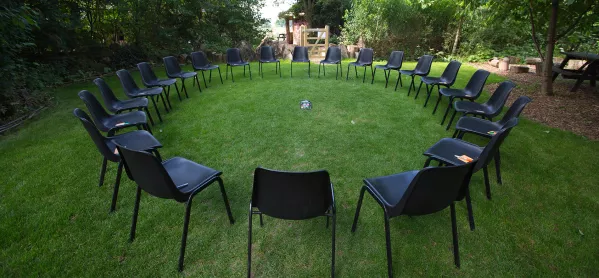I cannot recall any lecture during my teacher training about the emotional impact the children would have on me.
That wasn’t why I went into teaching. I did it to have an impact on my students; I didn’t sign up for it to be a two-way street.
Quick read: The end-of-term finish line is near - let’s not stumble
Quick listen: The truth about mental health in schools
Want to know more? School leaders shouldn’t just leave new staff members to sink or swim
A couple of years ago, the Department for Education ran a promotional campaign to get people into teaching, using the slogan “every lesson shapes a life”. This presumably referred to the lives of children, yet my life is also shaped by every lesson.
Even after 20 years of teaching, I would find myself crying in a lay-by after an emotionally tough day.
The trouble is that, in a busy school, it can be hard to find someone to talk to.
Where are we supposed to dump the junk that naturally gathers when managing so many professional relationships? Where do we empty our emotional buckets? Where does all this messy stuff get discharged?
I know what most of us do with it: try to bury it and ignore it. Or eat it. Or run it off.
I can tell you what we don’t do with these feelings; we don’t talk about them. Often, we will act them out.
We’ll let rip at the unsuspecting person at the photocopier when the paper tray has jammed. We’ll snap/shout/huff, puff and generally blow the house down around our loved ones.
So where should teaching staff be going to talk about these feelings without judgement? Supervision groups.
These groups are not new, they just aren’t readily found in educational settings. Supervision, in this term, doesn’t relate to being managed or checked up on, and it’s not about line management or appraisals.
A supervision group was defined by our facilitator as: “Communication between two or more staff, intended to enhance staff performance and effectiveness in carrying out the requirements of their post. A supervision group is a chance to reflect with others. The purpose of the group is not to tell other people what to do. Nor is it a therapy group.
“Inevitably, personal things will be discussed sometimes and acknowledged appropriately. But instead of exploring personal things in great depth, our focus will be on how they affect our work and our working relationships.”
Safe space
It is a planned and predictable safe space for people to talk openly. There are no notes, no agendas, and no hand-outs. The group is facilitated by a professional who has been trained to run supervision groups (and who is not part of the school staff team).
It is a group of like-minded souls trying to navigate their way through the stresses and strains that come with life and teaching.
I volunteered to be part of such a group because I didn’t want to go back to the lay-by. I wanted to see if I was the only person in my school who felt scared, terrified, frustrated and not good enough. Needless to say, I was not.
Here’s how supervision looks in my school:
-
The headteacher is committed to the value and worth of these groups and committed to supporting us;
-
The groups are open to new and existing staff but not senior staff (so that the hierarchy does not get in the way of honesty);
-
The process is voluntary;
-
Groups have up to six or seven members;
-
Members attend every fortnight at the same day and time;
-
Each session lasts an hour and starts and ends on time;
-
Confidentiality is assured.
There are challenges to setting up these groups, but investing in the wellbeing of the adults in school enables them to be emotionally lighter and have greater capacity to support and teach the children in their care.
I have been in the same supervision group for more than four years now and the group space feels like a decompression chamber. These sessions are planned and predictable moments where I can let off steam and express my feelings of not being good enough.
It is a space to dump my emotional junk. It has also become a space filled with acknowledgement, support, empathy and kindness, reflected by the people in the group who showed me that I am not alone.
Nathalie Downing is a specialist outreach teacher in a primary SEMH school in Oxford


